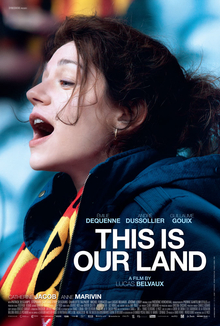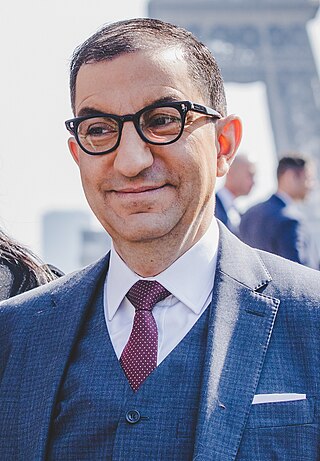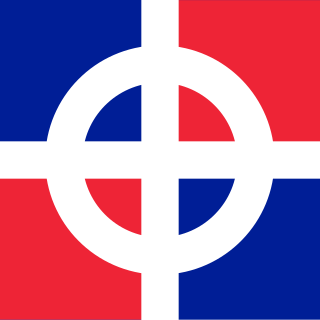
Jean Louis Marie Le Pen, known as Jean-Marie Le Pen, is a French politician who served as president of the far-right National Front from 1972 to 2011 and Honorary President of the same party from 2011 to 2015.

The National Rally, known as the National Front from 1972 to 2018, is a French far-right political party, described as right-wing populist and nationalist. It is the single largest parliamentary opposition party in the National Assembly since 2022. Its candidate was defeated in the second round in the 2002, 2017 and 2022 presidential elections. It opposes immigration, advocating significant cuts to legal immigration, protection of French identity, and stricter control of illegal immigration. The party advocates a "more balanced" and "independent" French foreign policy, opposing French military intervention in Africa while supporting France leaving NATO's integrated command. It also supports reform of the European Union (EU) and its related organisations as well as economic interventionism, protectionism, and zero tolerance for breaches of law and order.

Groupe Union Défense, better known as GUD, was a French far-right students' union formed in the 1960s. After a period of inactivity it relaunched in 2022.

Les Identitaires, formerly the Bloc identitaire, is an Identitarian nationalist movement in France. Like the French New Right, some generally consider the movement far-right or sometimes as a syncretic mixture of multiple ideologies across the political spectrum.
The Carrefour de l'Horloge, formerly Club de l'Horloge (1974–2015), is a French far-right national liberal think tank founded in 1974 and presided by Henry de Lesquen. The organization promotes an "integral neo-Darwinist" philosophy, characterized by a form of economic liberalism infused with ethnic nationalism.

Roger Holeindre was a French Army veteran, politician and author. He served in the First Indochina War and the Algerian War, was a member of the National Assembly from 1986 to 1988. Holeindre also served as the vice-president of the National Front (FN) where he represented the "national-conservative" tendency, opposed to "nationalist revolutionaries" and Third Position ideologies. Holeindre was the president of the Cercle national des combattants and the honorary president of the Party of France.
The far-right tradition in France finds its origins in the Third Republic with Boulangism and the Dreyfus affair. In the 1880s, General Georges Boulanger, called "General Revenge", championed demands for military revenge against Imperial Germany as retribution for the defeat and fall of the Second French Empire during the Franco-Prussian War (1870–71). This stance, known as revanchism, began to exert a strong influence on French nationalism. Soon thereafter, the Dreyfus affair provided one of the political division lines of France. French nationalism, which had been largely associated with left-wing and Republican ideologies before the Dreyfus affair, turned after that into a main trait of the right-wing and, moreover, of the far right. A new right emerged, and nationalism was reappropriated by the far-right who turned it into a form of ethnic nationalism, blended with anti-Semitism, xenophobia, anti-Protestantism and anti-Masonry. The Action française (AF), first founded as a journal and later a political organization, was the matrix of a new type of counter-revolutionary right-wing, which continues to exist today. During the interwar period, the Action française and its youth militia, the Camelots du Roi, were very active. Far right leagues organized riots.

Pierre Sidos was a French far right nationalist, neo-Pétainist, and antisemitic activist. One of the main figures of post-WWII nationalism in France, Sidos was the founder and leader of the nationalist organizations Jeune Nation (1949–1958) and L'Œuvre Française (1968–2013).
Jean-Gilles Malliarakis is a French far-right politician and writer.

Marion Jeanne Caroline Maréchal, known as Marion Maréchal-Le Pen from 2010 to 2018, is a French politician who has served as a Member of the European Parliament (MEP) since 2024. She is part of the Le Pen family, as the granddaughter of National Front founder Jean-Marie Le Pen and niece of its later leader Marine Le Pen.
Equality and Reconciliation (E&R) is a political association created in June 2007 by Alain Soral, former militant of the French Communist Party, and also a former member of the central committee of the far-right National Front (2007). Other founders are Jildaz Mahé O'Chinal and Philippe Péninque, two former activists of the Groupe Union Défense (GUD)

Serge Élie Ayoub, also known under the alias Batskin, is a French political activist associated with the far-right and formerly the hooligan movement.

This Is Our Land is a 2017 French-Belgian drama film directed by Lucas Belvaux and starring Émilie Dequenne, André Dussollier and Guillaume Gouix. It received seven nominations at the 8th Magritte Awards, including Best Film and Best Director for Belvaux, and won Best Actress for Dequenne.

Éric Dupond-Moretti is a French-Italian lawyer and politician who was appointed Minister of Justice in 2020 by President Emmanuel Macron. As a criminal defence lawyer, he is renowned for his number of acquittals which earned him the nickname "Acquitator", some of the controversial figures he defended, as well as his outspoken personality.

Jean Messiha is an Egyptian-born French far-right economist, media personality, and formerly a politician and senior civil servant. He was appointed Deputy Undersecretary of Management at the Ministry of Defence in 2014 before he joined the National Front (FN) in 2016, when he became spokesman of Horaces, a group of high-ranking civil servants and business executives who meet once a month to discuss the party platform. Messiha stood as a candidate in the 2017 legislative election in the 4th constituency of the Aisne department.

L'Œuvre Française, also called L'Œuvre, was a French nationalist, néo-Pétainist and antisemitic far-right movement founded in 1968 by Pierre Sidos. Inspired by the "semi-fascist" regimes of Vichy France, Francoist Spain and the Estado Novo, L'Œuvre Française was—until its dissolution by the authorities in 2013—the oldest nationalist association still active in France.

Martial Bild is a French journalist and politician. A leading member of the National Front until 2008, he co-founded the Party of France in 2009, and the web television TV Libertés in 2014.
TV Libertés, or TVL, is a French far-right Web TV launched in January 2014. The group is led by Philippe Milliau and Martial Bild, a former Front National leader. TV Libertés is recognized by observers for its professionalism when compared to other French far-right channels, and it seeks to compete with mainstream cable TV. Alain de Benoist and Gilbert Collard, among others, have hosted talk shows on the channel.
Sovereignty, Identity and Freedoms is a French political party led by Karim Ouchikh. Originally described as right-wing sovereigntist, it later moved towards Identitarianism. The party had 2,000 members in 2016.
Caroline Monnot, born on October 1, 1965, in Champigny-sur-Marne, is a French journalist. Since January 2021, she has been the editor-in-chief of the newspaper Le Monde.













